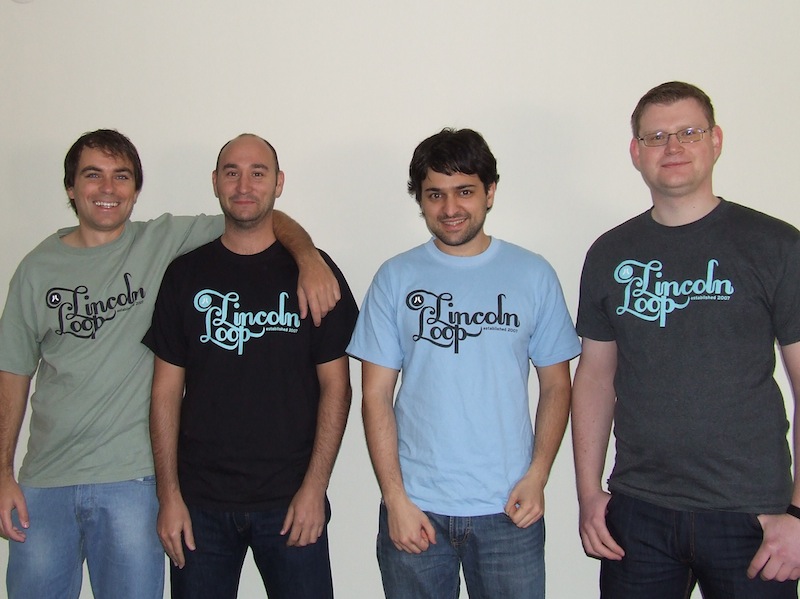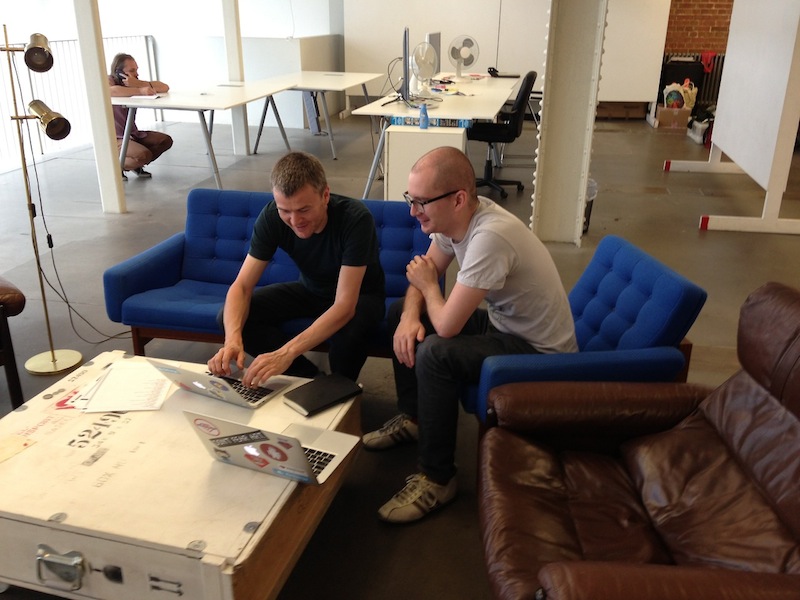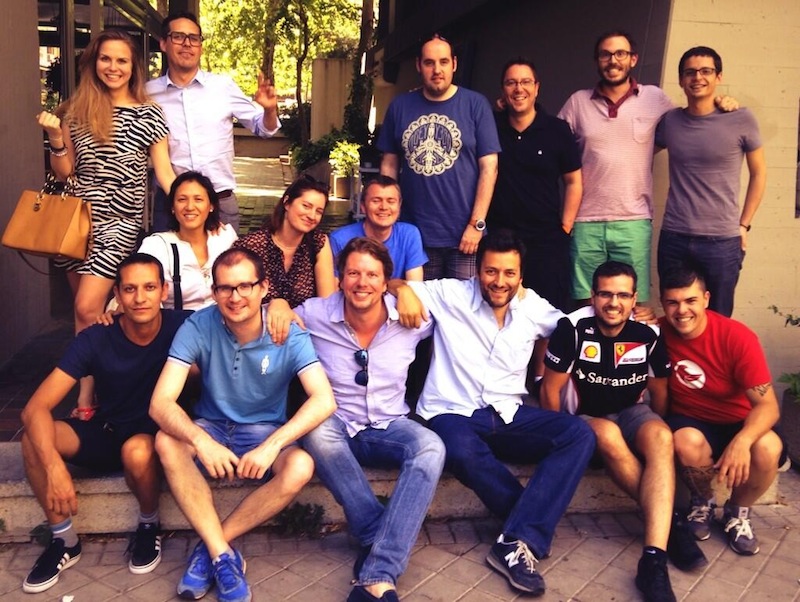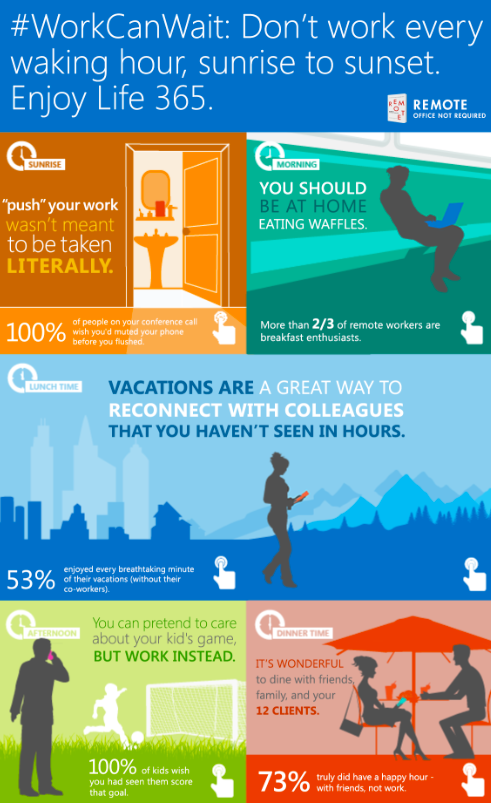We took the liberty of rewriting Microsoft’s dystopian vision of remote work ads. See more at #WorkCanWait and contribute your own revisions.
Signal v. Noise: Business
Start with our Best Hits on Business
- ⋆ When culture turns into policy
- ⋆ Some advice from Jeff Bezos
- ⋆ Video: Cool example of customers innovating behind…
- ⋆ Backstage: An inside look at how we use Basecamp
- ⋆ The Slicehost Story
- ⋆ Bootstrapped, Profitable, & Proud: GeekDesk
- ⋆ Every Bootstrapped, Profitable, & Proud in one place
- ⋆ Quote: Spinfree had a dirty little secret: It wasn…
- ⋆ How Intellum switched from making a plan for VCs to making a product for customers
- ⋆ Forget passion, focus on process
Our Most Recent Posts on Business
Microsoft's dystopian pitch for remote work
Microsoft is launching a new marketing campaign for Office 365 that celebrates working during your kid’s recitals, on vacation, and while enjoying the appetizer at a restaurant. All this under the guise of “balance” between work and life. Yes, it’s horrible.
Remote work is still stifled by managers who think that it’ll lead to employees goofing off, but we’re not making any progress if they switch to Microsoft’s pitch for getting to all those TPS reports from the bathroom. In fact, we’ll be worse off. Much worse.
Remote work is not about working more hours in more places. It’s not about invading every crevasse of your life and stuffing it full of work, work, work. Au contraire, mon ami. It’s about spending the hours of work more productively, and then having more time free from its tentacles.
Good ideas are co-opted and perverted all the time. Remote work is not just a good idea, but a great one. For shame on Microsoft for cheerleading its most dystopian corruption. (And no, I don’t fucking want to edit that Excel spreadsheet during happy hour.)
Unapologetically cheap
The Nexus 5 is a fascinating phone. In an era where Apple has set the luxury tone, and everyone is trying to follow suit in colors and chamfered edges, Google just said no. No, it won’t be luxury. In fact, it’ll be unapologetically cheap.
That’s a refreshing breath of honesty, and a clever way to sidestep one of Apple’s core strengths. If Google doesn’t have to compete on bringing luxury to the masses, they can compete on other things.
What’s scary for Apple is just how well that strategy appears to work when the main interface of the device is just all glass. Because while the Nexus 5 comes in a cheap plastic wrapping, the screen itself is gorgeous. Big, bright, and appealing. It’s very clear that this is where the bulk of the $349 purchase price went. Well that and the fast processor.
What it comes down to is that Google has made an appliance. A boring, no-thrills appliance. This is not a work of art. But it doesn’t pretend to be a work of art. That’s what has made all the Apple imitations so pathetic for so long. Remember the HP Envy (and can you believe that HP has left that embarrassment of a video online)? If you stand in the shadow of Apple’s luxury and design prowess, you will shiver.
It takes real vision to reject the prevalent frame of the market. Google has done just that with the Nexus 5. An appliance so good for what it is, that you realize that luxury is optional.
Read sample chapters from REMOTE in Inc. Magazine
In addition to Jason’s regular “Get Real” column in Inc., the magazine reprinted several chapters from REMOTE: Office Not Required. If you haven’t already read it or ordered your copy, they’re a great sneak preview!
Hey, Marissa Mayer, You’ve Got it Wrong: Telecommuting Isn’t A Bad Thing. It’s The Future
If you ask people where they go when they really need to get work done, very few will respond “the office.” If they do say the office, they’ll include a qualifier such as “super-early in the morning before anyone gets in,” or “I stay late at night after everyone’s left,” or “I sneak in on the weekend.”
Why Face-To-Face Meetings Are Overrated
How many breakthrough ideas can a company actually digest? Far fewer than you imagine. Most work is not coming up with The Next Big Thing. Rather, it’s improving the thing you already thought of six months — or six years — ago. It’s the work of work.
Working From Home Boosts The Quality Of The Work
When you can’t see someone all day long, the only thing you have to evaluate is the work. A lot of the petty evaluation stats just melt away. Criteria like “Was she here at 9?” or “Did she take too many breaks today?” or “Man, every time I walk by his desk he’s got Facebook up” aren’t even possible to tally.
How To Work With Clients You’ve Never Met Face To Face
It may be irrational but, if you’re local, the client often feels that, if worse comes to worst, they can knock on your door. They “know where you live.” But when you’re remote, they’re going to be more suspicious when phone calls go unreturned or emails keep getting “lost.”
The True Challenge of Managing Remote Workers: People Who Work Too Hard
A manager’s natural instinct is to worry that her workers aren’t getting enough work done. But the real threat is that they will wind up working too hard. And because the manager isn’t sitting across from her worker anymore, she can’t look in the person’s eyes and see burnout.
The Two Biggest Drags On Productivity: Meetings And Managers (Or, As We Call Them, M&Ms
These two staples of work life — meetings and managers — are actually the greatest causes of work not getting done at the office. In fact, the further away you are from both meetings and managers, the more work gets done. This is one of the key reasons we’re so enthusiastic about remote work.
Remote Works: Lincoln Loop
Name: Peter Baumgartner
Title: Founder
Company: Lincoln Loop
Established: 2007
Employees: 12, all remote

What does Lincoln Loop do?
Primarily web development, design, and consulting using the Django Web Framework. We’re also working on a couple of our own products. Ginger is actually geared towards improving communication for remote teams.
Did you start out as a remote company?
Yes. I started the company in Steamboat Springs, a small mountain town in Colorado. I was a ski bum/freelance developer who happened to stumble upon a good thing (Django). Pretty soon, business was booming and I needed help. The whole operation was bootstrapped so I didn’t have the budget to relocate people. Even if I could, I’m not sure I could entice them to be in the mountains and neck-deep in snow half the year. I wasn’t interested in moving to a “tech hub” and wanted to pull from a bigger talent pool than I had locally. Already being plugged into the open source world, working remote didn’t seem like a strange choice.
What challenges did you face in setting up as a remote company?
Like many others, I was enticed by cheap outsourcing arrangements. That was a nightmare and I quickly learned the value of having people you can trust implicitly on your side. After that, I was much more interested in cultivating a team of “managers of one” than attempting to micromanage a team of cheap outsourcers. Communication was rough at first, but we’ve got it pretty well dialed in now. It’s a combination of chat (IRC), voice/video (usually Hangouts), and asynchronous discussion (our own tool, Ginger).
What do you see as the major benefit of letting employees work offsite?
It puts them in control of their own lives. Autonomy is the number one indicator of happiness, and we can give them a lot of it. Interestingly, commuting has the exact opposite effect (lack of control and persistent source of unhappiness). We don’t lose people because they want to move, even if it’s to a different country.
Which would you rather have, a ping-pong table and a fridge full of sodas or the freedom to live anywhere in the world?
I’m living near the beach in Mexico now. Another one of our developers has lived in the Caribbean, France, and the Netherlands over the last few years. As far as job perks go, it’s huge in attracting new talent.

Which would you rather have, a ping-pong table and a fridge full of sodas or the freedom to live anywhere in the world?
Any advice for other companies who are considering going remote?
Trust and communication are the key components. If you don’t trust your employees, you need to fix that first (and perhaps ask yourself why you are working with people you can’t trust). Communication can be tough for somebody who is used to having lots of verbal communication and meetings in a co-located environment. Sticking to those patterns is setting your remote workers up to fail. They’ll always be out of loop.
Nat Friedman has a great post titled Everyone Dials In, where he describes how even co-located workers in his office called into meetings to ensure everyone was on equal footing. I think that’s the frame of mind you need to be in. Push all your communications to platforms where remote workers have equal opportunity to participate and soak up information.
Visit Lincoln Loop.
What a narrow definition of success
Harvard Business Review has another rah-rah piece for Silicon Valley. While on the surface it looks like a well-researched article, its error lies not in methodology but in definition. In the minds of the author, the definition for startup success is confined to this:
If you judge entrepreneurial success as surviving or selling (including raising follow-on funding, being bought, or successfully IPO’ing) as no doubt your investors do, then your odds of success are lower outside of the superhubs.
What a shitty definition of success! The world outside of Silicon Valley is rightfully not succeeding by the narrow definition of success espoused by proponents of the Valley VC model. DUH.
But there are many other definitions of success to measure yourself against. We’ve long been campaigning for the success of bootstrapped, proud, and profitable. Businesses, who like 37signals didn’t get off the ground by a Series A round of funding, and who do not see IPO, acquihire, or any other form of acquisition as a successful outcome.
This is how most of the world’s businesses work! And not only work, but prosper, and sustain themselves in the long run. But that’s the boring path of turning great products and services into profitable outfits in less than the average 10+ years it seems to take most Silicon Valley startups.
Do not let the VC merchants and their stooges tell you what success looks like. Do not accept that this path has to go through their 10:1, or 100:1, lottery funnel. You do not have to pick up their shovel and dig gold only where they have marked the X.
The best ideas and the best talent in the world is not confined to these tiny geographical areas, except in the minds of those who live there. Start your business wherever you want to live with pride. Recruit the best remote workers where they want to live with vigor. Success on your terms will come soon enough.
The person they’ll become
One of the biggest challenges when hiring someone is trying to envision their potential.
Sometimes someone’s a sure bet. They’re the perfect person for the perfect project at the perfect time. Their pedigree is exceptional, their portfolio is stocked with amazing work, their experience is vast, they’re a confident interview, and everything just feels right.
It happens, but that’s not how it usually works. There are very few perfect people.
Instead there’s a lot of future perfect people. People who have the potential to become the perfect person in the perfect role if just given the right opportunity.
When I hire designers, I look for future perfect people. Some people have the potential, but they haven’t had the opportunities. Their portfolios are full of mediocre work, but it’s not because they’re mediocre designers. It’s because they’ve been given mediocre opportunities.
A lot of future perfect people are stuck in current mediocre positions. They just haven’t had the chance to do their best work.
While it’s a bonus to find that perfect person today, I find more it more rewarding (for me and them) to pluck the future perfect person out of their mediocre job today. I love betting on people with potential. When they finally get that chance to do their best work, they blossom in such a special way.
And as the owner of a company, few things make me prouder than seeing someone excelling in a way that their resume/portfolio/references wouldn’t have suggested they could.
Cabin fever

Hell might be other people, but isolation sure ain’t heaven. Even the most introverted are still part of Homeous Socialitus Erectus, which is why prisoners fear The Hole more than living with other inmates. We’re simply not designed for a life of total solitude.
The occasional drawback of working remotely is that it can feel like you’re surrounded by plenty of people. You have your coworkers on instant messenger or in Campfire, you receive a constant deluge of emails, and you enjoy letting the trolls rile you up on Reddit. But as good as all that is, it’s not a complete substitute for real, live human interaction.
Fortunately, one of the key insights we’ve gained through many years of remote work is that human interaction does not have to come from either coworkers or others in your industry. Sometimes, even more satisfying interaction comes from spending time with your spouse, your children, your family, your friends, your neighbors: people who can all be thousands of miles away from your office, but right next to you.
But even if you don’t have friends or family nearby, you can still make it work; you’ll just have to exert a little more effort. For example, find a co-working facility and share desks with others in your situation. Such facilities can now be found in most larger cities, and even some smaller ones.
Another idea is to occasionally wander out into the real world. Every city, no matter how small, offers social activities to keep you sane and human, whether it’s playing chess in the park, finding a pickup basketball game, or volunteering at a school or library on your lunch break.
Cabin fever is real, and remote workers are more susceptible to it than those forced into an office. Fortunately, it’s an easy problem to address. Remote work doesn’t mean being chained to your home-office desk.
This essay comes from the Beware The Dragons chapter in our new book REMOTE: Office Not Required. The book is being released October 29, 2013.
Remote Works: BeBanjo, Spain
Name: Jorge Gómez Sancha
Title: Founder and Managing Director
Company: BeBanjo
Based in: Madrid, Spain
Established: 2008

What does BeBanjo do?
We build software for the video-on-demand industry. Basically, a video-on-demand service is something like Netflix. All of the operations that need to take place — from the moment that Netflix acquires content from the Hollywood studios, for instance, until that content is available for a user to watch — all those operations can be managed and tracked with our tools.
How many people work for the company, and of those, how many work remotely?
It goes up and down, but right now, around 16 people. Pretty much everyone works remotely in some fashion or other, but only two people, including myself, go consistently to the office. Some of them have an office to go to if they want; some don’t have an office in the city they’re working from. The main offices are in Madrid and in London. There are also people in the North and South of Spain. They can come to Madrid but they don’t regularly.

Why did you make the decision to go remote?
From the beginning, we realized we didn’t want to limit ourselves to working with local people. Also, we wanted it to be an international company because most of our customers, we knew, would likely be outside of Spain, which is the case. We only have one customer in Spain; the rest are all in the UK, France, the U.S., various countries. We made a point of making sure everyone felt OK with working remotely and very soon we were hiring foreign people.
My cofounder is Dutch. He was living in Madrid as well. Our language was always English; every communication is English. So it’s been in our DNA from the beginning, working remotely and being an international company.
What tools do you use to collaborate remotely?
For our code repositories for our software we use GitHub. For communications or for chat we use Campfire — we always have a Campfire room open. We use Basecamp when we work with customers. We use an internally built tool, a digital kanban board, to have a place where anyone can look and see exactly what development stage each feature is in. That’s become the heart of our day-to-day. All our infrastructure is virtual, so we use Amazon web services. There are no physical servers or anything, just our laptops.
What challenges did you face in setting up as a remote company?
One thing we realized very quickly is that not everybody is cut out to work remotely. It became obvious that we needed to find self-motivated, responsible, professional guys who like what they do, and it’s not a problem for them to sit in front of their computers at home. There’s no easy way to micromanage someone remotely, and we didn’t want to. We wanted to work with guys who would raise the bar. We find that good, self-motivated, responsible guys are also perfectly capable and willing to work remotely as well. Maybe not everyone we worked with initially was perfectly suited for that. Soon that stopped being a problem because everybody we hired was aware that this was the case.
Working remotely also requires an extra effort in terms of communication. If someone is sitting in the office, I pretty much know what he’s doing. If we’re not in the same office, I sometimes lose track. It requires them to be proactive in providing information. The same goes for me — if I don’t communicate, then no one knows what’s going on with me, whether we’re signing new customers or things like that.
What do you think are the major benefits of being remote for your team?
They feel like grown-ups, if you know what I mean. Normally in Spain, people are used to working a specific number of hours and being watched in terms of what time you come in, what time you leave. For us, the focus has always been: what can you do? What are you giving back? That’s the agreement. You do whatever you need to do — you want to wake up at noon, and start working then? Fine with us, but why are you doing this — does it make you more productive? Basically, people get more and more responsible with their time, because they are given a vote of confidence, and they return that greatly. That’s something people appreciate a lot, being treated as a grown-up.
I don’t even count vacation days or how many hours you work. I expect you to do what you need to do and be responsible, and the moment you aren’t, it’s immediately obvious to everybody. If you’re doing your work, it’s clear to everybody. If you’re not, then it’s also clear — even working remotely, just by the output. That’s one big benefit. They know they’re hired because they’re experts at what they do and they’re not treated like children.
That doesn’t mean that everybody’s left on their own and no one cares about them. We are very conscious about how people are feeling, whether they’re happy or frustrated. We make it a point to manage that. But no one cares about times, vacations, things like that. And people are super responsible in general.
Any advice for other companies who are considering going remote?
If you find the right people, it’s incredibly easy to do. Start with the people you think can manage it — who are responsible, self-motivated, enthusiastic about their work and so on. And also try with the people who request it — they will make a bigger effort to make this work than anyone else, because it’s in their interest.

Another thing is to communicate a lot — try to get in the habit of writing an email every other week or so sharing what’s going on, whether you’re the boss or whether you are just a guy working there. It’s super interesting to everybody to know what’s going on in the company, and just generate a sense of community and team. That is hugely important.
Find a place where people can go to virtually and feel they’re being seen as well. Although people are comfortable working remotely, maybe you’re hacking away at your software for hours, and you’re not talking to anybody because you’re concentrating. People start feeling anxious: “they’re going to be thinking that I’m not doing anything,” when actually they are working very hard. It’s important they have somewhere they can go to get rid of that stress factor, like a chatroom or something they can check into and say “I’m around if you need me; I’m just busy doing something else.” It’s a detail, but we’ve seen that helps.
It should be a big incentive for any company to get into working remotely: good people, good developers, good designers — they are all over the world. They are not just in your local town. Working remotely — opening the door to doing that — just opens the door to finding great people all over the place. If you’re used to working remotely and it’s easy to bring people onboard because everybody works like that, you’ll be able to hire anyone if your project is interesting and you pay good money. This kind of work is attractive to the sort of people you might be looking for: self-motivated, intelligent, and active people are attracted to this way of working.
Visit BeBanjo.




